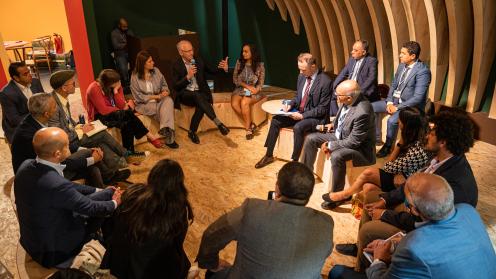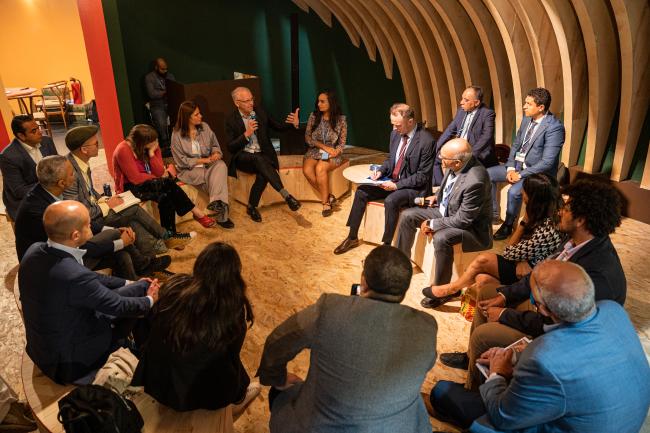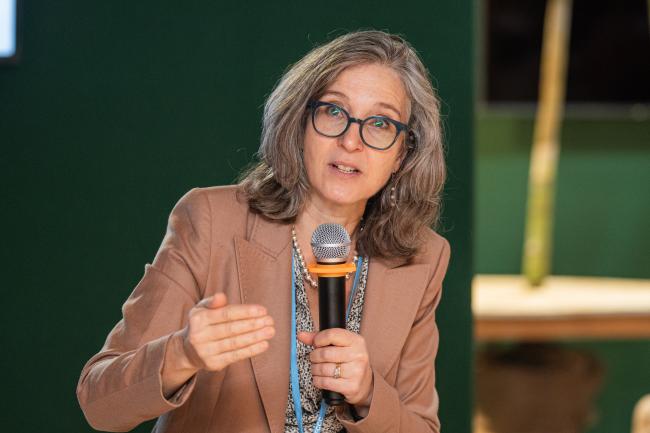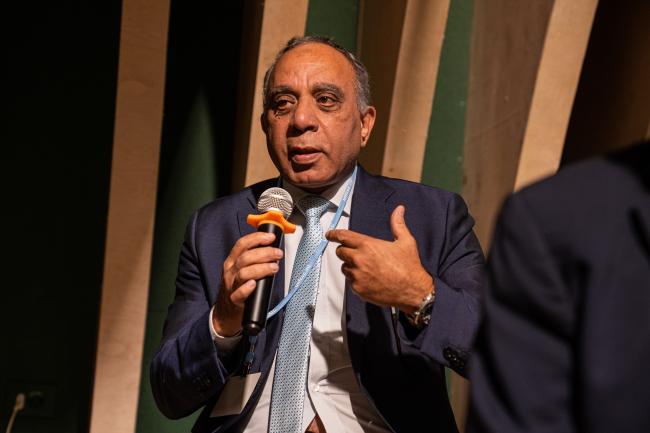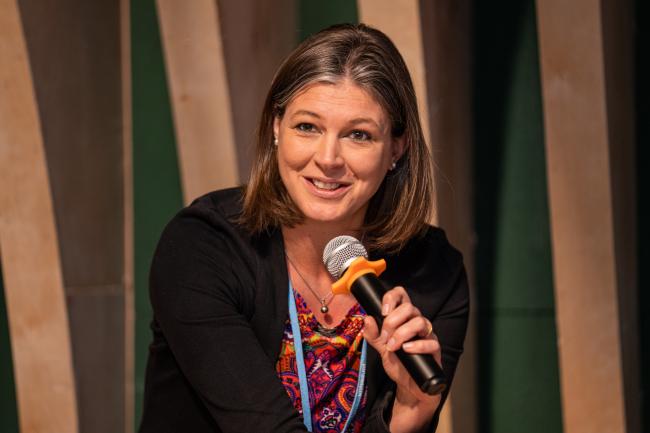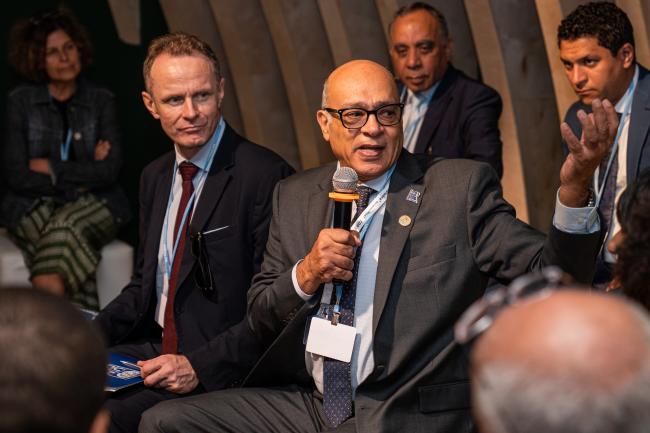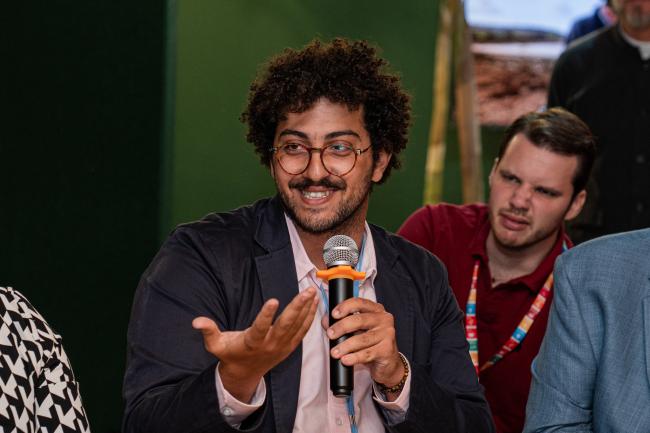Regenerative Food Production
Producing food in harmony with nature is key to building more resilient food systems that have a net-positive impact on the environment. Smaller scale holistic practices of food production can help us to renew nature, confer resilience and ensure global food security. We can scale-up sustainable farming methods using frontier technologies to analyse soil and climatic conditions in real time. With this vision in mind for the future, the Resilience Frontiers Pavilion set out its seventh pathway: “Regenerative Food Production.”
In the day’s first discussion on leveraging frontier technologies to accelerate smallholder adaptation, Richard Choularton, Tetra Tech, prompted speakers to discuss their experience in utilizing the newest technologies to help farmers improve food production.
Harm Haverkort, Acorn, discussed Acorn’s work in creating a platform, which uses satellite data, artificial intelligence, and different methodologies to provide farmers with reliable information and assessment of land conditions to determine the best place to plant trees. One example he cited is calculating delta in biomass so deforestation is checked, which helps determine carbon prices for the land. This not only provides additional income for farmers, he pointed out, but also promotes sustainable practices.
Molly Brown, 6th Grain, discussed how her company uses remote-sensing technology to estimate fungal risk for tomato farmers in Egypt. This, she explained, allows them to monitor tomato fields and inform farmers when problems arise that may cause tomato yields to plummet. She also discussed how 6th Grain uses satellite data to advise farmers on crop health to better inform their decisions.
Boniface Akuku, Kenya Agricultural and Livestock Research Organization, shared his organization’s use of satellite data to map farms in Kenya and provide information on accurate weather updates through the use of mobile applications. He pointed out that since literacy is a barrier to technology use, information was translated into the local language and a call center was established so farmers can more easily access information.
Bernhard Kowatsch, UN World Food Programme, discussed the challenges present in the food production value chain, such as scaling up hydroponics to the global level, which requires capacity and knowledge. Hassan Gomaa, CEO, Tseppas, highlighted the challenge of changing people’s mindsets, for example, being open to substituting regular wheat for quinoa.
Georgina Campbell Flatter, TomorrowNow.org, highlighted the importance of co-designing agricultural technology products with farmers from the outset to ensure they are part of the process and understand how the technology benefits them.
Chris Redmond, Hot Poets, closed the event with a poem on the use of technology to transform farming practices for a better future.
Engy Abdel Wahab, UN Development Programme (UNDP) Acclab Egypt, moderated the Pavilion’s second event on the use of climate-smart crops. In welcome remarks, Sylvain Merlen, UNDP Egypt, discussed the UNDP Accelerator Labs and their work on creating solutions to address sustainable development issues. He cited UNDP’s work in Egypt creating drought-resilient hybrid crops, which resulted in increases in yields and profits for farmers.
Abdel Wahab then presented a video of Egypt in 2050, showing a future where climate-smart crops and farming techniques, such as hydroponics, are utilized by farmers
Emad Adly, Global Environment Facility (GEF) Small Grants Programme, emphasized that real solutions to transforming food systems already exist, such as private sector innovation and science-based policies, but underscored the need to always keep the farmers at the center of what we do. Marwan Rasmy, Greenish, also emphasized that farming communities are key to bridging the gap between private sector initiatives and government policies. Implementing adaptation and resilience strategies and fixing problems in the value chain can only happen if “we focus on the people,” he stressed.
Mark Wyllie, CEO, Beyti, shared that farmers readily adopt technology when they see how it benefits them. He cited an example of using data collection technology from dairy farmers. When shown data on milk protein levels and on milk production, the farmers understood how technology could help them, he concluded.
Sarada Krishnan, Crop Trust, highlighted the need to diversify the food palate and utilize other crops to ensure food and nutrition security. She cited her organization’s work on Crop Wild Relatives where a drought-resilient wheat variety was created that can adapt to the local climate. She said the project not only helped farming communities in Peru and Morocco, but it also allowed them to look at the diversity within the crop itself, which helps with food and nutrition security.
Abdelazem Hassona, Tseppas, discussed experiments conducted to develop their climate-smart products, which was driven by consumers’ increased interest in healthy and gluten-free products.
In closing the session, Liv Torc, Hot Poets, offered a poem on working with farmers and adopting climate-smart crops to ensure food security. Following this, a food exhibition and tasting showcased delicacies created from climate-smart crops.
During the day’s final session, members of the Hot Poets, some via video clips, performed poetry that captured hopeful stories of science and action that inspire people. Afterwards, Torc and Redmond conducted a creative writing workshop, asking participants to write one line of poetry about the audience-chosen word “community.” The content collected from this session was turned into a poem by the Hot Poets.
Organizers: Resilience Frontiers
UNFCCC Contact: Susan Robertson I srobertson@unfccc.int
For more information: https://resiliencefrontiers.org
To receive free coverage of global environmental events delivered to your inbox, subscribe to the ENB Update newsletter.
